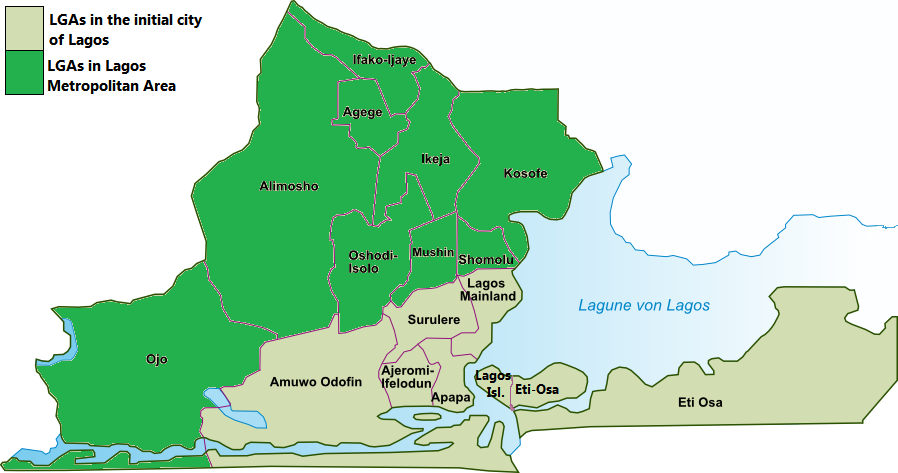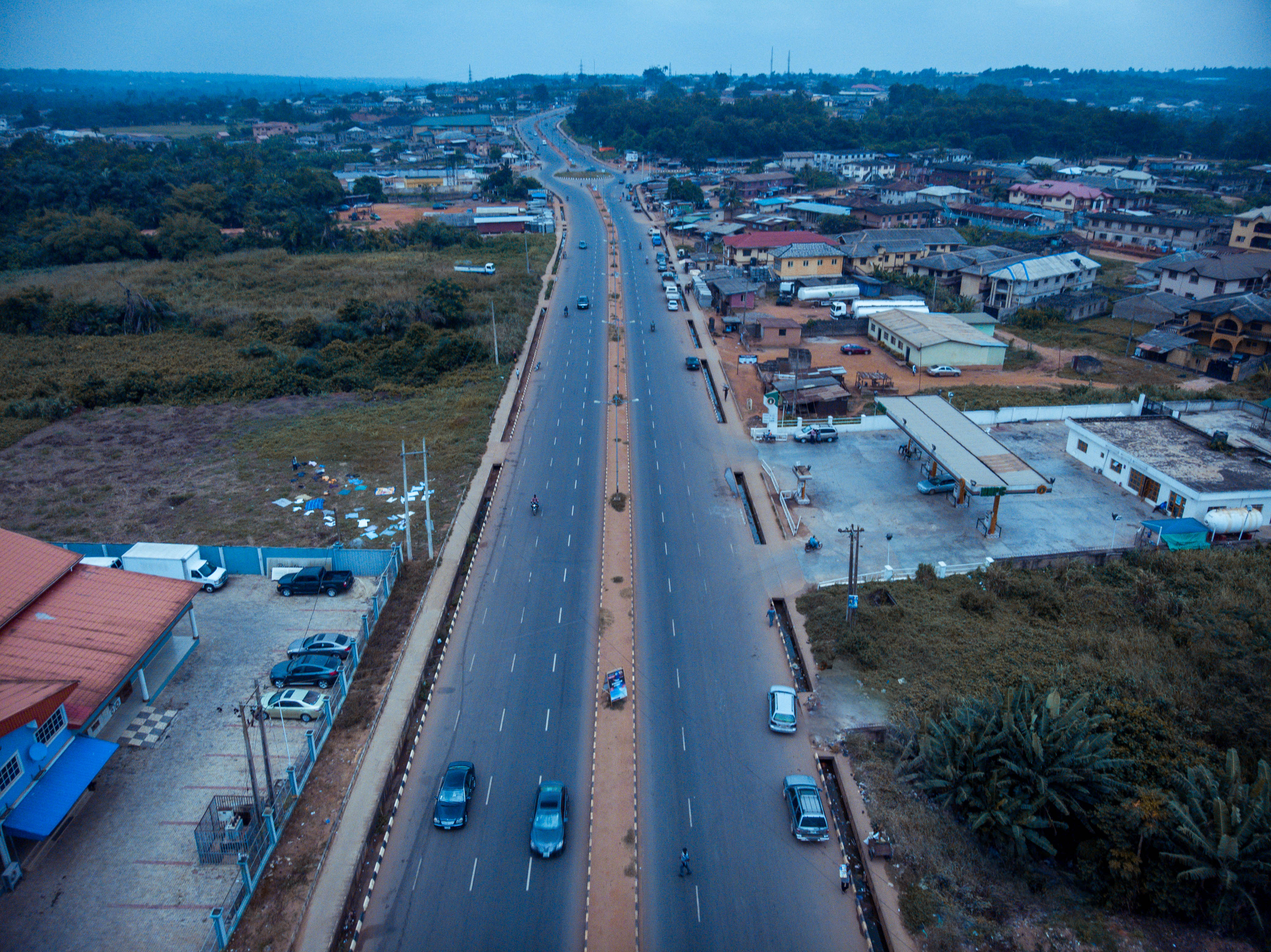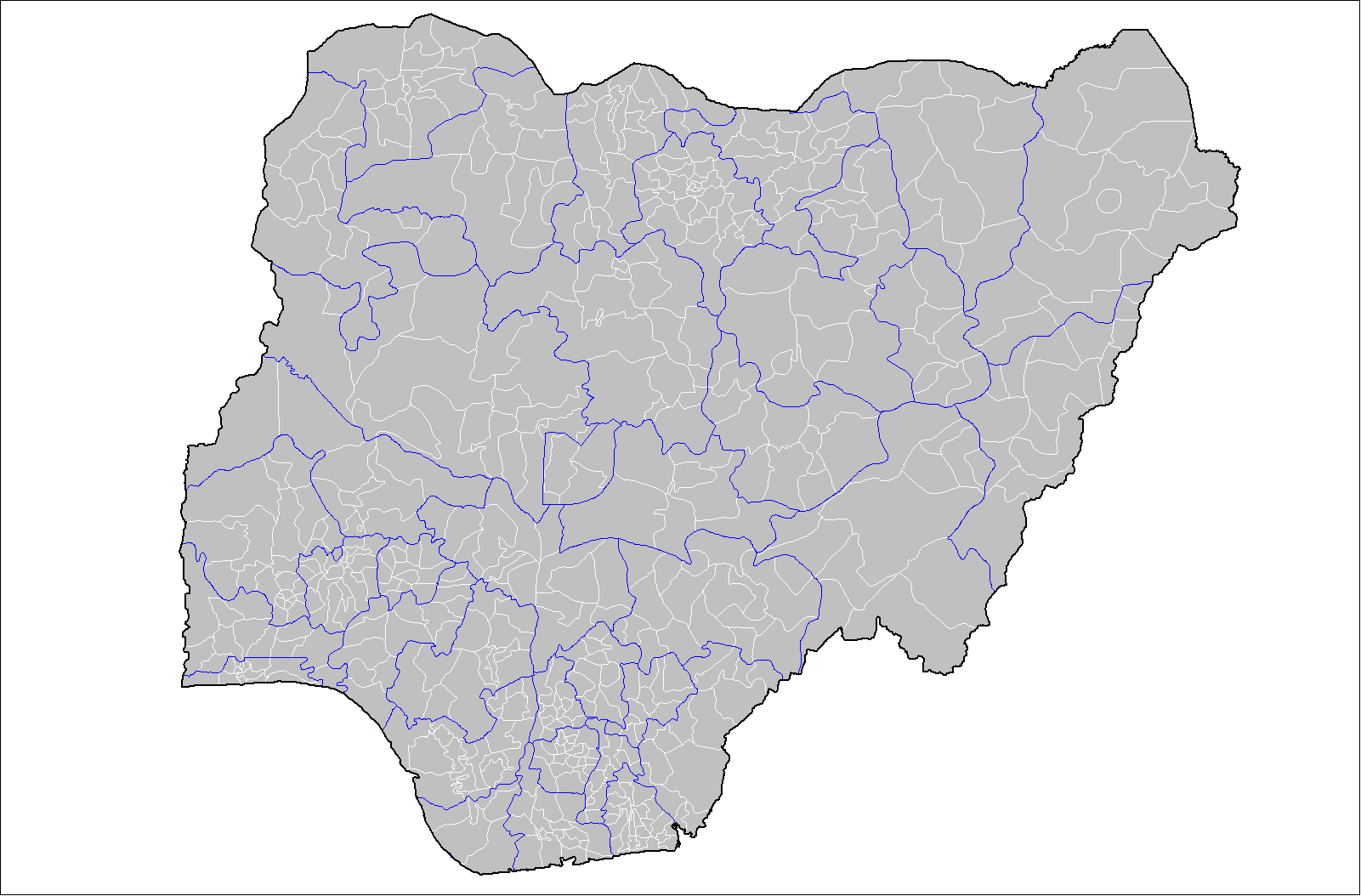|
Ikorodu
Ikorodu is a city in Lagos State, Nigeria. It is located to the north-east of Lagos, along the Lagos Lagoon and shares boundary with Ogun State. With a population of over 1 million inhabitants, Ikorodu is currently the 12th largest city in Nigeria and growing at a rate of 5.26% annually, it is projected to reach 1.7 million inhabitants by 2035, It is the 2nd largest local government in Lagos State. Indigenous settlers of Ikorodu Emigration, emigrated from Sagamu in Ogun state. Geography and economy Situated approximately 37 km north of Lagos, Ikorodu is bounded to the south by the Lagos Lagoon, to the north by a boundary with Ogun State, and to the east by a boundary with Agbowa-Ikosi, a town in Epe, Lagos, Epe Division of Lagos State. The town has grown significantly in the past 40 years and is divided into sixteen or seventeen "Ituns" or minor areas. The main industries in the town are trading, farming and manufacturing. Ijebu dialect is widely spoken in ikorodu. Nearby ... [...More Info...] [...Related Items...] OR: [Wikipedia] [Google] [Baidu] |
Lagos State
Lagos State (, ) is a States of Nigeria, state in South West, Nigeria. Of the 36 States of Nigeria, Nigerian states, Lagos is the second List of Nigerian states by population, most populous state but the List of Nigerian states by area, smallest in terms of land mass. Bounded to the south by the Bight of Benin and to the west by the Benin–Nigeria border, international border with Benin for 10 km, Lagos State borders Ogun State to the north for about 283 km, making it the only Nigerian state to border only one other state. Named for the city of Lagos—the List of urban areas in Africa by population, most populous city in Africa—the state was formed from the Western Region, Nigeria, Western Region and the former Federal Capital Territory on 27 May 1967. Geographically, Lagos State is dominated by bodies of water with nearly a quarter of the state's area covered with bodies of water. The largest of these bodies are the Lagos Lagoon, Lagos and Lekki Lagoon, Lekki lagoo ... [...More Info...] [...Related Items...] OR: [Wikipedia] [Google] [Baidu] |
Lagos
Lagos ( ; ), or Lagos City, is a large metropolitan city in southwestern Nigeria. With an upper population estimated above 21 million dwellers, it is the largest city in Nigeria, the most populous urban area on the African continent, and one of the fastest-growing megacity, megacities in the world. Lagos was the national capital of Nigeria until the Government of Nigeria, government's December 1991 decision to move their capital to Abuja, in the centre of the country. Lagos is a major African financial center, financial centre and is the economic hub of Lagos State and Nigeria at large. The city has a significant influence on commerce, entertainment, technology, education, politics, tourism, art, and fashion in Africa. Lagos is also among the top ten of the world's fastest-growing cities and Urban area, urban areas. In 2024, Time Out (magazine), Time Out magazine ranked Lagos as the 19th best city to visit in the world. A megacity, it has the second-highest Gross domestic pr ... [...More Info...] [...Related Items...] OR: [Wikipedia] [Google] [Baidu] |
Sagamu
Sagamu or Ishagamu is an agglomeration of thirteen towns in southwestern Nigeria. It is located in Ogun State along the Ibu River and Eruwuru Stream between Lagos and Ibadan. It was founded in the mid 19th century by members of the Remo branch of the Yoruba people. The 13 towns are: Makun, Offin, Sonyindo, Epe, Ibido, Igbepa, Ado, Oko, Ipoji, Batoro, Ijoku, Ijagba and Latawa. It is the capital of Remo Kingdom, and the paramount ruler of the kingdom, the ''Akarigbo'' of Remo, has his palace is in the town of Offin. The Sagamu region is underlain by major deposits of limestone, which is used in the city's major industry, the production of cement. Agricultural products of the region include cocoa and kola nuts. Sagamu is the largest kola nut collecting center in the country. The kola nut industry supports several secondary industries such as basket and rope manufacturing, which are used to store the kola nuts. The city was founded in the mid-19th century when several small t ... [...More Info...] [...Related Items...] OR: [Wikipedia] [Google] [Baidu] |
Local Government Areas Of Nigeria
Nigeria has 774 local government areas (LGAs), each administered by a local government council consisting of a chairman, who is the chief executive, and other elected members, who are referred to as councillors. Each LGA is further subdivided into a minimum of ten and a maximum of twenty wards. A ward is administered by a councillor, who reports directly to the LGA chairman. The councillors fall under the legislative arm of the local government, Local Government, the third tier of government in Nigeria, below the state governments and the federal government. Functions The functions of local governments are detailed in the Constitution of Nigeria, Nigerian constitution and include the following: * Economic recommendations to the State. * Collection of taxes and fees. * Establishment and maintenance of cemeteries, burial grounds and homes for the destitute or infirm. * Licensing of bicycles, trucks (other than mechanically propelled trucks), canoes, wheelbarrows and carts. * Esta ... [...More Info...] [...Related Items...] OR: [Wikipedia] [Google] [Baidu] |
Lagos Lagoon
Lagos Lagoon (Yoruba language, Yoruba: Ọ̀sà) is a lagoon found in the city of Lagos, southwest Nigeria, the most populous city in Africa. The name ''Lagos'' means 'lakes' in Portuguese language, Portuguese, therefore ''Lagos Lagoon'' is an example of a tautological place name. The lagoon lies between the Atlantic Ocean and Lagos State. It is one of the ten lagoons in Lagos State and the largest in the Gulf of Guinea which spans over . The lagoon is a habitat for different Aquatic animal, aquatic organisms, such as various species of fish that are sources of income and food for communities surrounding it. Physical characteristics The lagoon is more than 50 km long and 3–13 km wide, separated from the Atlantic Ocean by a long sand spit 2–5 km long. Its surface area is approximately 6,354.7 km². The lagoon is fairly shallow and is not plied by ocean-going ships, but by smaller barges and boats. It receives the discharge of the Ogun River and the Osun Riv ... [...More Info...] [...Related Items...] OR: [Wikipedia] [Google] [Baidu] |
Agbowa-Ikosi
Agbowa-Ikosi is an ancient town in the Nigerian state of Lagos. On it lies the second biggest asphalt concrete road in Nigeria. History Agbowa-Ikosi started from a place known today as Egunbesawo. The town is divided into several districts (''Itun''); Aledo, Oriwu, Agbowa, Kosomi (no water) and Ehindi. Each district is governed by their chief-head known as ''Olori Itun'' and generally by a single head of the town known as the ''Olu-Ilu'', which was transformed into Baleeship and later to Kingship. In 1956, His Royal Highness, Oba Edward Alausa Thomas OLUFUWA was crowned the first king of Agbowa-Ikosi, from the Oguntolu-Olufuwa Ruling House. Five houses agreed to rule over the town. While suburban villages such as Ikosi, IGBENE, Oko-Ito, Oke-Olisa, Gberigbe and others are governed by Baale (who reports to the paramount King with the title of “Abowa of Agbowa-Ikosi). Other chiefs who assisted the king are classified according to their grades such as Chief Olisa, who is the next ... [...More Info...] [...Related Items...] OR: [Wikipedia] [Google] [Baidu] |
Rice Huller
A rice huller or rice husker is an agricultural machinery, agricultural machine used to automate the process of removing the chaff (the outer husks) of grains of rice. Throughout history, there have been numerous techniques to hull rice. Traditionally, it would be pounded using some form of mortar and pestle. An early simple machine to do this is a rice pounder. Later even more efficient machinery was developed to hull and polish rice. These machines are most widely developed and used throughout Asia, the most popular modern type in use today is the Engelberg Huller Company, Engelberg huller designed by German Brazilian engineer Evaristo Conrado Engelberg in Brazil and first patented in 1885. The Engelberg huller uses steel rollers to remove the husk. Other types of huller include the disk or ''cono'' huller which uses an abrasive rotating disk to first remove the husk before passing the grain to conical rollers which Rice polisher, polish it to make white rice; this is done r ... [...More Info...] [...Related Items...] OR: [Wikipedia] [Google] [Baidu] |
Rice
Rice is a cereal grain and in its Domestication, domesticated form is the staple food of over half of the world's population, particularly in Asia and Africa. Rice is the seed of the grass species ''Oryza sativa'' (Asian rice)—or, much less commonly, ''Oryza glaberrima'' (African rice). Asian rice was domesticated in China some 13,500 to 8,200 years ago; African rice was domesticated in Africa about 3,000 years ago. Rice has become commonplace in many cultures worldwide; in 2023, 800 million tons were produced, placing it third after sugarcane and maize. Only some 8% of rice is traded internationally. China, India, and Indonesia are the largest consumers of rice. A substantial amount of the rice produced in developing nations is lost after harvest through factors such as poor transport and storage. Rice yields can be reduced by pests including insects, rodents, and birds, as well as by weeds, and by List of rice diseases, diseases such as rice blast. Traditional rice polyc ... [...More Info...] [...Related Items...] OR: [Wikipedia] [Google] [Baidu] |
Infrastructure
Infrastructure is the set of facilities and systems that serve a country, city, or other area, and encompasses the services and facilities necessary for its economy, households and firms to function. Infrastructure is composed of public and private physical structures such as roads, railways, bridges, airports, public transit systems, tunnels, water supply, sewers, electrical grids, and telecommunications (including Internet connectivity and broadband access). In general, infrastructure has been defined as "the physical components of interrelated systems providing commodities and services essential to enable, sustain, or enhance societal living conditions" and maintain the surrounding environment. Especially in light of the massive societal transformations needed to mitigate and adapt to climate change, contemporary infrastructure conversations frequently focus on sustainable development and green infrastructure. Acknowledging this importance, the international co ... [...More Info...] [...Related Items...] OR: [Wikipedia] [Google] [Baidu] |
Rice Mill
A rice mill is a food-processing facility where paddy (unmilled rice) is processed by cleaning the grain, removing the hull, sorting, and packing the rice, leaving it in its final form for sale to consumers. Process The entire product is procured from paddy fields, milled and processed hygienically in modern machinery and dust-free environment and cleaned through sorting machines. Paddy procurement Paddy is harvested from the fields to be processed. The paddy is again rechecked before the process begins. The procured paddy is checked bag by bag by a team and stored in Paddy Milling Plants. Cleaning and boiling To start with the production process, paddy is cleaned by a paddy pre-cleaning machine and the cleaned paddy is stored in raw paddy storage bins. The stored paddy is moved to food-grade stainless steel soaking tanks. Water is drained from the tank and the wet paddy is ready for boiling. Boiling is done by a steam boiler. The boiled paddy is then moved to the paddy ... [...More Info...] [...Related Items...] OR: [Wikipedia] [Google] [Baidu] |
Commodity
In economics, a commodity is an economic goods, good, usually a resource, that specifically has full or substantial fungibility: that is, the Market (economics), market treats instances of the good as equivalent or nearly so with no regard to who Production (economics), produced them. The price of a commodity good is typically determined as a function of its market as a whole: well-established physical commodities have actively traded spot market, spot and derivative (finance), derivative markets. The wide availability of commodities typically leads to smaller profit margins and diminishes the importance of factors (such as brand, brand name) other than price. Most commodities are raw materials, basic resources, agriculture, agricultural, or mining products, such as iron ore, sugar, or grains like rice and wheat. Commodities can also be mass-produced unspecialized products such as chemical substance, chemicals and computer memory. Popular commodities include Petroleum, crude ... [...More Info...] [...Related Items...] OR: [Wikipedia] [Google] [Baidu] |
Babajide Sanwo-Olu
Babajide Olusola Sanwo-Olu (born 25 June 1965) is a Nigerian politician who has served as the governor of Lagos State since 2019. Sanwo-Olu became governor under the platform of the All Progressives Congress after winning the APC gubernatorial primaries against then-incumbent governor, Akinwunmi Ambode who had fallen out of favour with his alleged political sponsor. He is a graduate of the University of Lagos, London Business School, Lagos Business School and the John F. Kennedy School of Government. Before his gubernatorial ambition, he was the managing director and CEO of Lagos State Property Development Corporation (LSPDC). Education Sanwo-Olu briefly attended Government Demonstration School, Gbaja Surulere before moving to Ijebu-Ife Grammar School, Ogun State to complete his secondary education. He has a BSc in Surveying and an MBA from the University of Lagos. He is an alumnus of the John F. Kennedy School of Government, the London Business School and the Lagos Bus ... [...More Info...] [...Related Items...] OR: [Wikipedia] [Google] [Baidu] |








